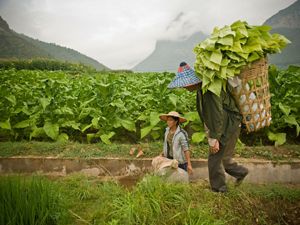The Nature Conservancy (TNC) is building on the protection work for which we're known, and now we are working with corporations and governments to apply smart infrastructure siting principles to make development more sustainable and using innovative finance to complete large deals that have the potential to protect more nature in the next five years than we have during our entire history.
For example, in China, we're introducing the country to a distinctly TNC-style approach—land trusts. The land trust model allows TNC to bring the private sector into conservation, giving local people, businesses and individuals a chance to help ensure that China’s most important lands and waters will be sustainably managed and protected into the future.
The Chinese government has established more than 2,500 nature reserves throughout the country, but most aren’t well funded or actively managed. And, until recently, China’s strict landownership laws made it difficult for non-governmental organizations to play a significant role in land protection. But in 2008—while maintaining ownership of all land—the government opened the door for Chinese private entities to hold forestland use rights.
Now, The Nature Conservancy is testing a model that will enable Chinese land trusts to protect and sustainably manage China’s most important lands and waters, provide livelihood solutions for communities living near reserves, and create a mechanism to finance long-term reserve management through private contributions.
Our goal is to create 10 land trust reserves together with our partners by the end of 2020. Over time, we aim to mobilize the private sector to protect China’s land through voluntary action.
To date, working through local organizations, such as the Paradise Foundation, we have established four land trust reserves.
In 2013, TNC initiated China’s first land trust reserve: 27,325-acre Laohegou Land Trust Reserve. Laohegou links several existing reserves in Sichuan’s Pingwu County that together sustain a wide array of plants and animals, including golden snub-nosed monkeys, takin (a sheep relative that resembles a goat and an antelope), Asian black bears, Asian golden cats and musk deer. Pingwu County also has the highest density of endangered giant pandas in the world.
Learn about giant pandas!
We are also helping communities near Laohegou profit from forest-friendly livelihoods. Working with the Paradise Foundation, we established a community development fund to help jump-start a guesthouse and an agriculture program that connects farmers to high-end markets for sustainable food products like honey, eggs, chickens, sausage and persimmons. So far, more than 60 families have been able to double their income through eco-friendly agriculture.
This has reduced the amount Laohegou villagers are degrading forest resources within the reserve, and wildlife are beginning to return to Laohegou in greater numbers, including species that have not been found in the reserve before. Now, we are using the Laohegou model to initiate other land trust reserves that fulfill ecological and social goals.
At Longwu Land Trust Reserve in Zhejiang Province, we are adapting our water fund model to help rural communities to steward water resources in ways that also support their livelihoods. For example, we’re helping farmers transition to organic agriculture, which means they will use fewer chemicals that contaminate the town’s drinking water, and they will be able to access a higher paying market for their products. Businesses and individuals that invest in the water fund will help communities make these transitions, while paying for additional clean water protection in the watershed as the fund grows.
.jpg?crop=0%2C231%2C4000%2C2200&wid=4000&hei=2200&scl=1.0)


